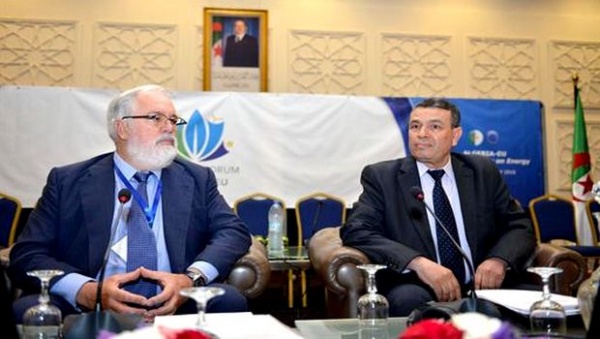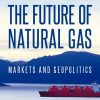The Algeria-EU business forum on energy cooperation held in Algiers last 23 and 24 May has for the first time put together Algerian and European industry representatives and public officials, including regulatory authorities. The forum aimed to foster European investments in the Algerian energy sector, from hydrocarbons to electricity, energy efficiency and renewables, identifying the obstacles hindering the improvement of the sector’s regulatory environment. The initiative is framed in the EU-Algeria Strategic Energy Partnership, which is intended to reinforce energy cooperation between Algeria and the EU.
It has been argued that social, political and economic balances are shifting in the Mediterranean, and that Europe should offer a more credible narrative for regional energy cooperation to match Algerian preferences.1 The possibility of oil prices being ‘lower-for-longer’ is building up an internal consensus on the need to modernise the Algerian economy, and shifting political economy balances may further give rise to the conditions needed for genuine energy reform. In order to deliver additional incentives, a greater European engagement has been proposed to help the Algerian economy in different ways, from diversifying its productive base, renegotiating the EU-Algeria Free Trade Area, cooperating in renewable energy and finding more paths to political rapprochement.2
“The most effective incentive the EU could offer would be an attractive model to integrate the country into the European energy market”
If the Algerian government’s propensity to reform is on the rise, the most effective incentive the EU could offer would be an attractive model to integrate the country into the European energy market, addressing its demand-security preferences. On the Algerian side it would be important not to continue missing the opportunity to project the country as a significant provider of energy security to an EU willing to diversify its gas imports away from Russia.3 For instance, the EU could consider offering Algeria better prospects of accessing the EU’s gas market in exchange for good energy governance to provide a more attractive framework for energy reform.4
If Algeria is unable to reform its energy sector, and the EU is unable to offer sufficient incentives to support the hesitant government in doing so, it would be a serious failure for both sides. For Algeria it would mean losing the opportunity to capitalise on its vast energy resources, modernising its economy and pursuing an economically sustainable development path. For Europe it would mean turning Algeria from being part of the solution to the EU’s energy challenges into its next energy security problem and, more critically, it would further destabilise its already troubled Southern neighbourhood.
The Algeria-EU energy forum has brought to light the difficulties in advancing in such a new, more attractive, energy narrative from the European side. The European companies and the Commission insisted on the points already raised at a previous meeting with Sonatrach executives last March, including the lack of quality offers, red tape, rigid contracts and unfavourable fiscal terms.5 There were, however, interesting nuances between European companies: Those from northern Europe and the French Engie were especially tough on the need for Algeria to adapt to the new gas market realities and shift towards more flexible contractual terms; Italian and Spanish companies, while sharing the need for Algeria to reform its energy policy, took a more moderate stance by highlighting the EU’s need to offer clearer prospects to Algeria to access the European energy market.
“The Forum was mainly perceived in Algeria as a renewed episode of Europe applying pressure to open up its energy sector and to renegotiate the long-term contracts that are set to expire through 2021”
It is true that there was a concession to more constructive paths to energy cooperation, such as a €10 million technical assistance loan to support Algerian renewables and energy efficiency programmes.6 Some participants found the dialogue concerning renewables and energy efficiency far more constructive than the positions expressed on the oil and gas sector. This may sound paradoxical because Algeria has the lowest rate of renewable achievability in North Africa, with installed capacity lagging behind most other countries with regard to its own targets.7
Nevertheless, the Forum was mainly perceived in Algeria as a renewed episode of Europe applying pressure to open up its energy sector and to renegotiate the long-term contracts that are set to expire through 2021. While the Algerian Energy Minister, Salah Khebri, was receptive to the companies’ demands he also proved reluctant to dismiss long-term contracts, on the grounds that it would damage investments in the gas chain.8 A former Algerian Energy Minister, Abdelmadjid Attar, was more explicit, declaring that Europe is not proposing anything particularly new and seems to be focusing exclusively on contractual and investment terms.9 The Algerian government also stressed the obstacles that the lack of intra-EU gas interconnections, mainly between Italy and Spain and the rest of Europe, poses to the better integration of Algerian gas in the European market.
It is time for Europe to develop a clear and attractive vision for its energy relations with Algeria. This is the only kind of rapprochement that can deliver substantial incentives and resources to the Algerian government to embark on energy and wider economic reforms while maintaining political stability and internal and border security. It remains to be seen whether the next steps of the EU-Algeria Strategic Energy Partnership can offer a more attractive energy narrative than the one delivered in its first business forum or will rather result in yet another missed opportunity for both the EU and Algeria: for the EU to diversify its gas imports and contribute to stabilising such an axial North African country; and for Algeria to present itself as a credible supplier to the EU, willing to reform its energy sector and adapting itself to a rapidly changing global gas landscape.
Gonzalo Escribano
Director of the Energy and Climate-Change Programme at the Elcano Royal Institute | @g_escribano
1 G. Escribano (2015), ‘Towards a Mediterranean Energy Community: No Roadmap Without a Narrative’, in Rubino, Otzurk, Lenzi & Costa (Eds.), Regulation and Investments in Energy Markets. Solutions for the Mediterranean, Academic Press, Elsevier.
2 See for instance the op-ed by Javier Solana, ‘Peril and Promise in Algeria’, Project Syndicate, 25/II/2016; G. Joffé (2015), ‘The Outlook for Algeria’, IAI Working Papers 15/38; A. Lebovich (2016), ‘Algeria: The Stirrings of Change?”, in A. Dworkin (Ed.), Five Years On: A New European Agenda For North Africa, ECFR, February, p. 39-51; and S. Tagliapietra & G. Zachmann, ‘Reinvigorating EU-Algeria Energy Cooperation’, Bruegel Blog,, 10/VI/2015.
3 G. Escribano, ‘A political economy of low oil prices in Algeria”, Columbia Center on Global Energy Policy Working Paper, forthcoming.
4 G. Escribano (2015), op. cit.
5 Reuters, ‘European Union and energy firms court Algerian gas cooperation’, 24/V/2016.
6 Forum d’affaire UE-Algérie sur l’Energie, Communiqué de presse conjoint, Algiers, 24/V/2016.
7 B. Brand (2015), ‘The Renewable Energy Targets of the MENA Countries: Objectives, Achievability, and Relevance for the Mediterranean Energy Collaboration’, in Rubino et al., op. cit.
8 El Watan, “Marché Européen du gaz: L’Algérie mise en difficulté”, 24/V/2016.
9 El Watan, “Secteur Energétique: Les investisseurs restent frileux”, 25/V/2016.



